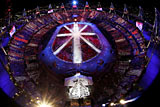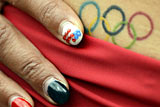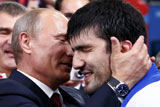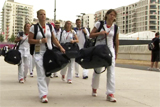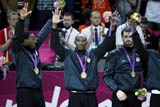
Buffet serves up Olympic recipe for success
Updated: 2012-07-18 02:37:05
By Ye Jun ( China Daily)
|
|||||||||||
Weight constantly weighs on Olympic judo champion Yang Xiuli's mind.
"On the morning before every match, you get up on the scales," said Yang, women's judo gold medalist at the Beijing Games.
"If you are so much as 0.1 kg, or 0.001 kg overweight, you'll be disqualified."
But she does not want to tip the scales much lower, either.
"I'll be at a disadvantage against opponents."
Yang keeps a close eye on the scales and watches her calorie intake assiduously. An extra bite or nibble could prove costly.
Yang is not alone. All the athletes staying at the national team's base, the Olympic Sports Center Hotel near the Asian Games Village in Beijing, are in the same dietary boat.
The center is hosting 672 athletes, coaches and staff members ahead of their departure for London and is the biggest among six in Beijing, according to Yan Ketong, general manager of the hotel.
The athletes eat at Wei Yuan Ting (Source of Flavor Hall), on the first floor of the hotel. The restaurant helps athletes monitor weight, energy levels and, of course, their nutrition.
|
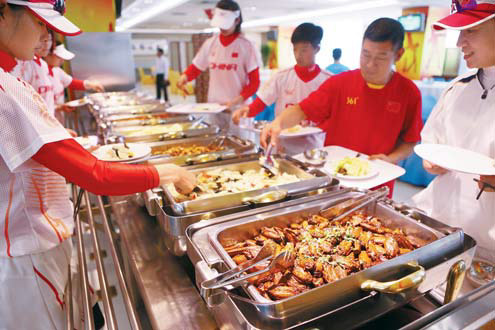 Wei Yuan Ting gives athletes the nutrition required to take on the world. CUI MENG / CHINA DAILY |
The restaurant provides a buffet, instead of a set menu, and all the major food categories are served. Athletes lack for nothing regarding choice and can select from 110 different types of food.
A buffet is a practical arrangement because athletes require a high intake of calories and it provides variety, according to Yan.
Hygiene and food safety are obvious priorities.
"Meat comes from designated sources approved by the General Administration of Sport," Yan said. "Every batch must pass quality tests by a designated institution."
Athletes have been told not to dine out, have food delivered, or buy snacks outside. A notice board at the entrance of the dinning room asks athletes not to bring in food.
The restaurant keeps samples of all food served for 48 hours. Meat samples are kept even longer just in case there are any problems.
Dishes are designed based on advice from the nutrition center at the Institute of Sports Medicine.
Members of the nutrition center regularly visit the athletes and give advice on the best food for their particular discipline.
Executive chef Li Li says the most difficult part of his work is that he has to think up new dishes all the time. For example, fish and beef are served at both lunch and dinner. But they must be prepared differently.
"Dinner must be different from lunch. Tomorrow must be different from today. Next week must be different from this week," says Li. "We change the menu every month.
"We hope the athletes can eat as many different types of food as possible, and not the foods they like, but the foods their body needs," says Fu Guoyi, Yang's coach.
The athletes, though, don't always follow the chefs' design.
Li said there was a time when chefs at the restaurant just boiled vegetables before serving them. Because the taste was too bland, athletes mostly just ate meats. When Li came half a year ago, he changed that by showing his colleagues how to use the big woks and give the vegetables distinctive tastes.
The buffet at the restaurant has 12 hot dishes, 12 cold dishes, two salads, two Chinese dim sums and two Western pastries, eight kinds of staple foods, four soups and fruits. LED lamps shine on the dishes to make them look tempting.
A typical summer lunch in the restaurant has eggplant slices with squid, fried sliced yam with green and red bell pepper slices. Some major meat dishes include red-braised chicken wing, stewed pork with starch noodle, and lamb steak imported from New Zealand. Two major seafood dishes are steamed plaice fish head and braised prawn.
Because there are Muslim athletes, sliced braised pork is put at the end of a row of food stands. Bread and pastries are freshly prepared at the restaurant.
Wei Yuan Ting serves 400-500 athletes at every meal. One very popular food they consume in summer is sliced watermelon.
"The athletes consume 250 kilograms a day in summer, and 150 kilograms a day in winter," Yan said. "Therefore we make watermelon available in the restaurant all year round, although it can get rather expensive in winter."
Yang said after training, most athletes did not feel like eating right away. Yang is training six hours a day for the coming Games.
"I need to eat some fruits and drink some water, before I can have the appetite to eat a meal," she said.
The eatery serves kiwi juice, hawthorn juice, orange juice, Sprite and a particularly refreshing homemade sour plum juice made with 11 herbal ingredients.
Li said in summer, the restaurant tries to make dishes taste light, or slightly spicy, to increase the athletes' appetite.
Moreover, chefs have to watch closely to see which dishes the athletes like or dislike.
"When we find some dishes are not consumed much, we will change the way of their preparation," Li said. "On the other hand, if athletes particularly like to eat some dishes, we also need to take them away soon, to prevent partiality in nutrition."
Once a month, the restaurant puts on some extra "big dishes" at the buffet, such as malatang, a Sichuan-style spicy dish, beef or lamb hot pot, scallops, prawns, squilla or sea cucumbers.
The hotel has 32 cooks and more than 20 wait staff, working in two restaurants and a function room. When there is no major sporting event, such as the Olympic Games, the other restaurant and hotel rooms are available for reservations from the outside.
Fu said every team has a "food committee" to communicate with the athletes' restaurant on nutrition and taste preferences.
"The 'committee' usually consists of a coach, an athlete, a sports doctor, a scientific researcher and a nutritionist," said Fu.
yejun@chinadaily.com.cn
Medal Count |
||||
| 1 | 46 | 29 | 29 | |
| 2 | 38 | 27 | 22 | |
| 3 | 29 | 17 | 19 | |
| 4 | 24 | 25 | 33 | |
| 5 | 13 | 8 | 7 | |
| 6 | 11 | 19 | 14 | |
